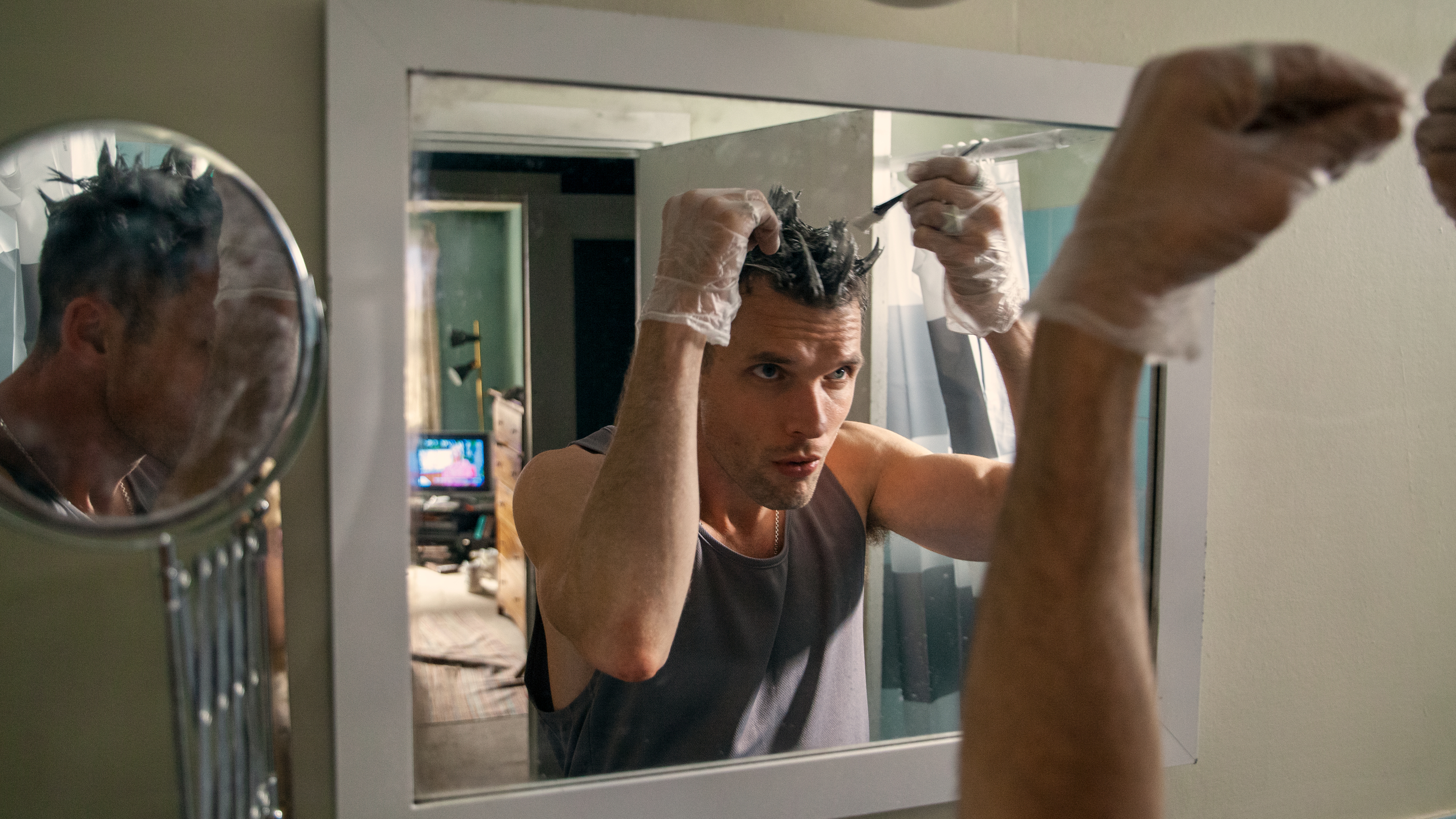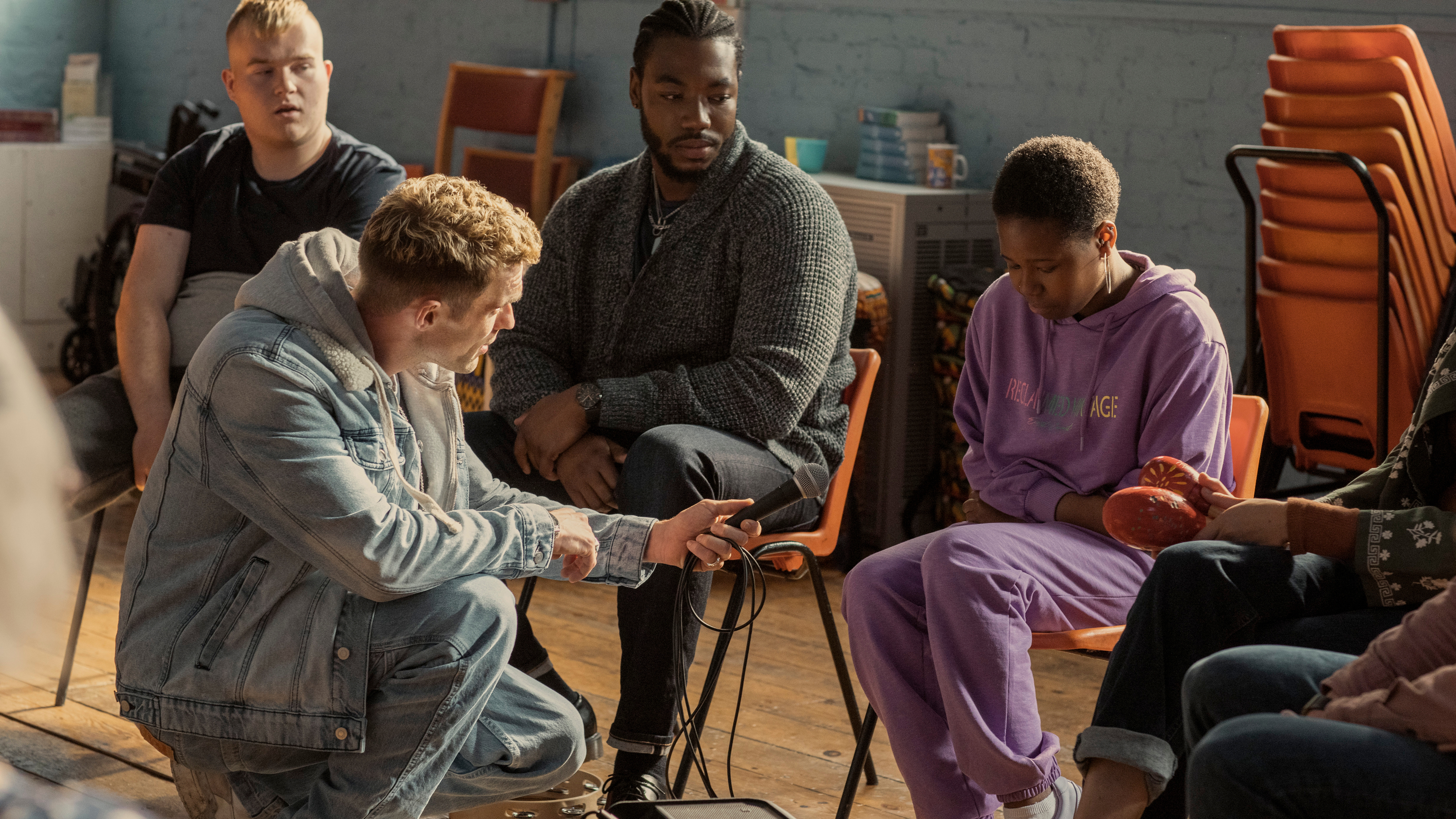Films about drumming tend to be intense, volatile affairs which leave you feeling like you’ve just duked it out with Animal from The Muppets. Think about the terrifying hurling of insults and cymbals in Oscar winner Whiplash, for example. Or the emotional rollercoaster of Riz Ahmed’s deaf noise-punk in Sound of Metal. And documentary, Beware of Mr. Baker, the hair-raising look at legendary sticksman Ginger Baker, added further weight to the theory that those who make a living pummelling various tom-toms are a different breed. Thankfully, a new Netflix musical drama about the healing power of paradiddles is a little easier on both the nerves and the ear.
I Used To Be Famous stars Deadpool and one-time Game Of Thrones man Ed Skrein as Vince, a washed-up former boyband star who spends his days carting multiple synths around South East London begging disinterested bar owners for the chance to showcase his new more mature sound. Living in the kind of flat that would give Marie Kondo palpitations and unable to even afford a much-needed cider, his woes are compounded by the fact that old Stereo Dream bandmate Austin (Eoin Macken) has effortlessly made the transition from teen pin-up to all-conquering serious artiste.

Much to Vince’s chagrin, the latter has also since made enough money to smugly announce a farewell tour on cosy breakfast TV. You can imagine the other members of One Direction shooting similar daggers at Harry Styles in 20 years’ time.
Vince’s slightly sorry situation starts to change, though, when a rehearsal – strangely staged in front of the market square traders who call him a has-been – is gatecrashed by Stevie (Leo Long), an autistic 18-year-old passerby (Leo Long) clutching a pair of drumsticks.
Pretty soon, their impromptu jam session has racked up 100,000 views online. All attempts to capitalise on this sudden viral fame, however, are hampered by said teen’s mother Amber (Game of Thrones’ Eleanor Matsuura) who’s understandably concerned that life on the road might not be particularly conducive to her son’s condition.
Not that she’s ever painted as the villain of the piece. Adapting his own 2015 short, co-writer and first-time director Eddie Sternberg has stated that he was inspired by the likes of Billy Elliot, East Is East and The Full Monty (“that sort of heartfelt British film with a bit of grit, with earned heart that doesn’t become cheesy”). And apart from an abusive punter who satisfyingly gets his comeuppance and Neil Stuke’s manipulative band manager, I Used To Be Famous is stacked with characters that help put this labour of love in the same category.
Rolling back the years…
Despite his pin-up past, Vince is far from just a vacuous pretty boy, even if he does amusingly attempt to turn the clock back by bleaching his hair blonde. Haunted by the death of his younger brother, whose passing and funeral his hectic boyband schedule forced him to miss, the singer spends much of his downtime watching fuzzy camcorder footage from his youth. A terse and long overdue visit to his mother (Lorraine Ashbourne) also hints that there’s a deep family rift.

Best-known for playing hardmen in the likes of The Transporter Refuelled and Ill Manors, Skrein proves he’s more than just a buzzcut and pair of fists (although the latter do get used), imbuing his downtrodden musician with just the right amount of doggedness and vulnerability. He also shares a naturally sweet chemistry with his younger co-star, whose charming big screen debut more than justifies the casting team’s nationwide search.
Indeed, I Used To Be Famous has certainly done its best to swerve the tone-deaf mistakes that sank Sia’s vanity project Music. Not only does Long identify as neurodivergent, but producers also worked closely with several autistic organisations to give a portrayal that avoids the usual stereotypical tics.

The fact that Sternberg has an autistic cousin who found comfort behind a drum kit might explain why the movie feels more intimate and less designed-by-committee than the majority of Netflix originals. Sure, you can almost predict exactly what lessons everyone will have learned by the time the inevitable standing ovation brings things to a close. Yet the story never feels forced, nor does it try to heighten the stakes to unnecessary levels. At its heart, this is simply about two talented musicians wanting to do what they do best.
Luckily, both parties convince when the unlikely dream get to take to the stage. As a former rapper who worked with cult heroes Asian Dub Foundation and Foreign Beggars, Skrein makes for a magnetic frontman, even if Vince’s music is more emotive electronic pop than socially-conscious hip-hop (the original songs were penned by Hannah Reid and Dan Rothman of chillout maestros London Grammar). Long’s rhythmic skills, meanwhile, are as impressive as his acting: see the introductory gig in which his pots and pans percussion puts the Stomp gang to shame.
Our Verdict…
I Used To Be Famous does occasionally attempt to extend its reach towards music industry satire. A dispiriting early phone call with a record label takes a jibe at the skewed priorities of today’s execs (“You need a few hundred-thousand followers on TikTok”). And flashbacks to Vince’s Smash Hits Poll Winners Party days hints at the mind games used to keep already-exhausted pop idols on the treadmill to the detriment of their family life and mental health.
But it’s the mismatched buddy relationship, rather than any meditations on fame, between Vince and Stevie that wisely remains the focus. If you’re hoping for a cynical recreation of the Bros documentary –something perhaps hinted by its title – then you need to look elsewhere. I Used To Be Famous is only really concerned with putting a smile on your face and an affecting synth-pop song in your heart.
I Used To Be Famous is released on Netflix on Friday (September 16).




